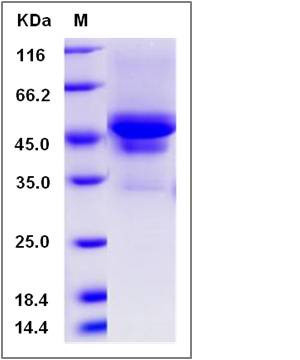Canine Carbonic Anhydrase IX / CA9 Protein (His Tag)
CA9
- 100ug (NPP1830) Please inquiry
| Catalog Number | P70028-D08H |
|---|---|
| Organism Species | Canine |
| Host | Human Cells |
| Synonyms | CA9 |
| Molecular Weight | The recombinant canine CA9 comprises 384 amino acids and has a predicted molecular mass of 42.1 kDa. The apparent molecular mass of the protein is approximately 50 kDa in SDS-PAGE under reducing conditions due to glycosylation. |
| predicted N | Gln 38 |
| SDS-PAGE |  |
| Purity | > 85 % as determined by SDS-PAGE |
| Protein Construction | A DNA sequence encoding the canine CA9 (NP_001138646.1) (Met1-Leu410) was expressed with a C-terminal polyhistidine tag. |
| Bio-activity | Measured by its esterase activity. The specific activity is >100 pmoles/min/μg. |
| Research Area | Signaling |Signal Transduction |Signaling Pathway |Calcium Signaling |Calcium Binding Proteins |
| Formulation | Lyophilized from sterile PBS, pH 7.4 1. Normally 5 % - 8 % trehalose, mannitol and 0.01% Tween80 are added as protectants before lyophilization. Specific concentrations are included in the hardcopy of COA. |
| Background | Carbonic anhydrases IX (CA IX), also known as membrane antigen MN or CA9, is a member of the carbonic anhydrase (CA) family and may be involved in cell proliferation and cellular transformation. CAs are zinc metalloenzymes that catalyze the reversible hydration of carbon dioxide (H2O + CO2 = H+ + HCO3–) and thus participate in a variety of biological and physical processes. CA IX protein is expressed primarily in carcinoma cells lines, and the expression is cell density dependent and has been shown to be strongly induced by hypoxia, accordingly facilitates adaptation of tumor cells to hypoxic conditions. It is involved in tumorigenesis through many pathways, such as pH regulation and cell adhesion control. CA IX is used as a marker of tumor hypoxia and as a new therapeutic target for many human carcinomas and cancers. |
| Reference |
